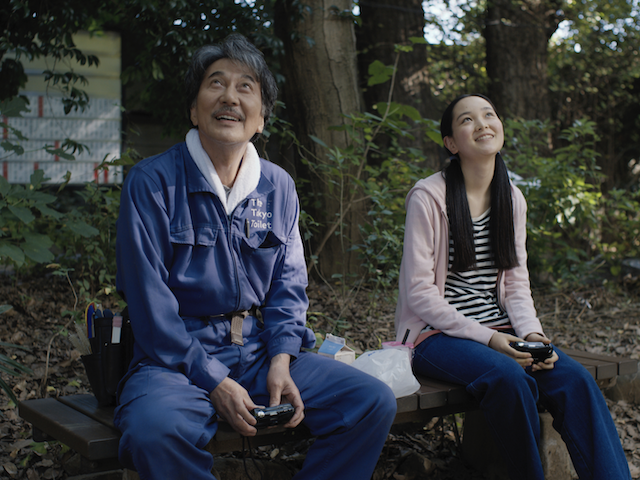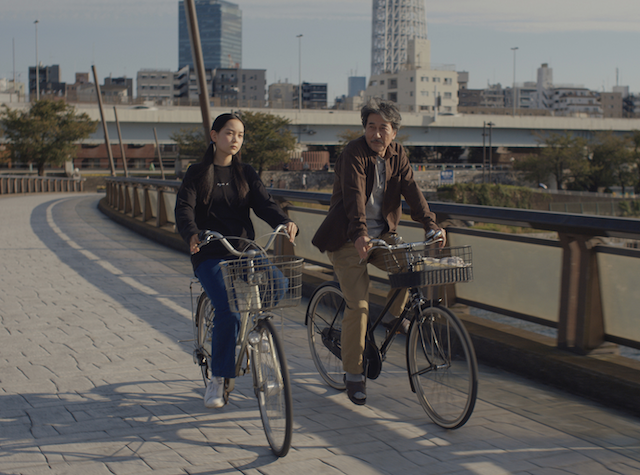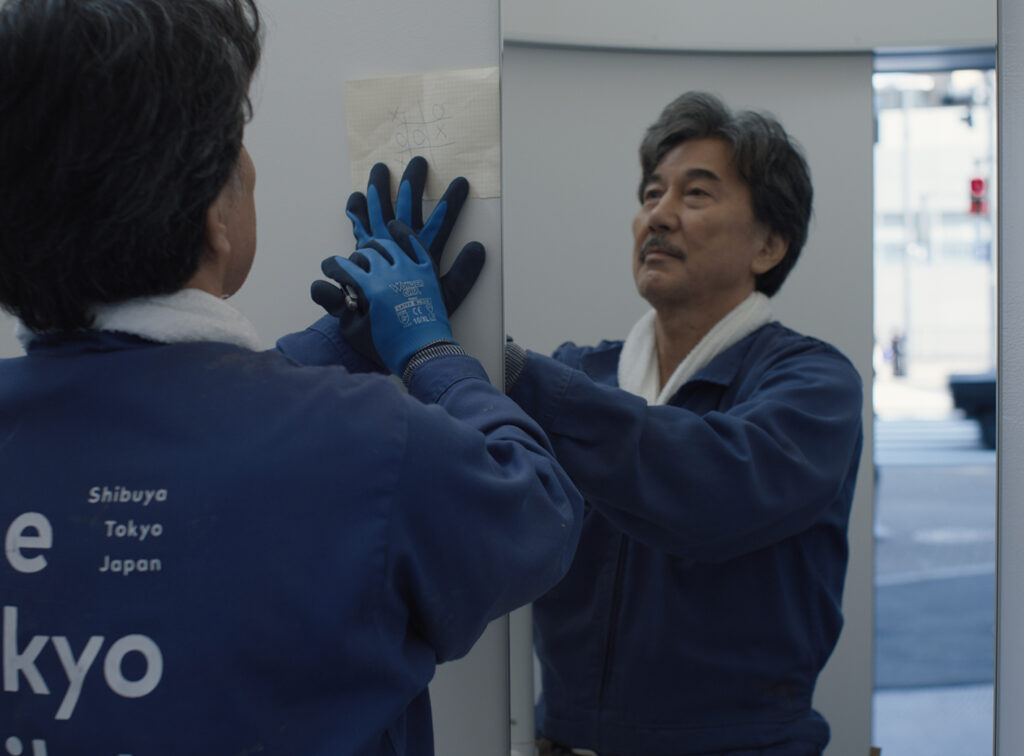
Courtesy of Neon
The film directed by the illustrious German filmmaker was presented in competition at the 2023 Cannes Film Festival, where it won the Prize of the Ecumenical Jury and the Best Actor Award for Kōji Yakusho. Wim Wenders’ Perfect Days shows Japan through the eyes of a European, and was nominated for the Best International Feature Film at the 96th Academy Awards, becoming the first film not directed by a Nipponic filmmaker to be nominated as the Japanese entry.
If Yasujirō Ozu, back in 1953 with his Tokyo Story, unveiled how the elderly confronted the Japanese capital and the younger generation, Wim Wenders shows us the Nipponic metropolis of the 21st century with a similar dynamic. We experience this generational juxtaposition and much more through Hirayama (Koji Yakusho). He is the antihero par excellence. The middle-aged man, who cleans public toilet for a living, is not equipped with exceptional skills nor does he embark upon grand gestures, and yet his nobility stands within his sensitive tastes for the arts, that he manages to nurture whilst leading a humble and exemplary existence.
Interestingly enough, the entire film came about through a serendipitous occasion. Wim Wenders was invited to Tokyo by Koji Yanai to observe the Tokyo Toilet Project, that redesigned public toilets in 17 locations throughout Shibuya. His producers initially envisioned a series of short films to describe this architectural novelty, but with the help of co-screenwriter Takuma Takasaki the story expanded into a visual snapshot of humdrum existence.
We follow Hirayama’s daily routine, almost along the lines of The Truman Show and Groundhog Day. Every morning he gets his coffee can at a vending machine, outside his house, and goes to work in his van while listening to old music cassettes. His tiny home is not equipped with the habitual house amenities, so he goes to the public bath to wash and a laundromat to clean his clothes. Sometimes he wanders around Tokyo on his bike and indulges eating outdoors, in a small restaurant where he has befriended the owner Mama, played by the enka singer Sayuri Ishikawa.

Hirayama’s passions nostalgically lead us to an analog dimension. He uses a flip phone and on his lunch break he takes photos in parks, using an old film camera. The subject of his photography is the sunlight filtering through trees known as Komorebi, which is very emblematic for his persona. He is a quiet bystander, who lives in the shadows and we can watch the beauty of his mundane activities, as he grasps the rays of light leaking through the leaves.
Hirayama’s love for nature leads him to keep some plants at home, that he lovingly tends to every single day. Hirayama reads William Faulkner and Aya Kōda, authors that he picks from a bookshop he goes to on a regular basis. Hirayama is an observer, he tacitly contemplates the multitude of people populating the city, from a homeless man (Min Tanaka) to tourists trying to figure how to use the public toilets that have see-through walls and become opaque once they lock themselves inside. His days repeat endlessly as he delights himself with what may come across as trivial things, like finding a hidden paper in one of the toilets he cleans and starting a game of Xs and Os.
Although society ignores Hirayama he takes in his surroundings full heartedly, through a silent pensiveness. The older man’s interaction with the younger generation is with his goofy colleague at work Takashi (Tokio Emoto) and the girl he is wooing, the vibrant Aya (Aoi Yamada). She is impressed by Hirayama’s collection of music cassettes and is particularly spellbound by Patti Smith’s Redondo Beach, wondering if the song can be found on Spotify.

Courtesy of Neon
Music is the thread to Hirayama’s ‘Perfect Days’ and serves as an emotional compass to his state of mind. His mood may vary from The House of The Rising Sun by The Animals to Pale Blue Eyes by The Velvet Underground; from (Sittin’On) The Dock Of The Bay by Otis Redding to (Walkin’ Thru The) Sleepy City by The Rolling Stones; as well as from Brown Eyed Girl by Van Morrison to Aoi Sakana by Sachiko Kanenobu; and even from Sunny Afternoon by The Kinks to Feeling Good by Nina Simone; culminating of course with the song that inspired the title of the film: Perfect Day by Lou Reed.
Hirayama’s routine endlessly repeats until something unexpected occurs: his niece Niko (Arisa Nakano), shows up. The adolescent has run away from home and wants to be active in the day-to-day activities of her uncle, accompanying him at work, and reading one of his books: Patricia Highsmith’s Eleven: Short Stories. The tale of The Terrapin creates a parallel between Victor’s conflict with his mother and Niko’s friction with her mum, Hirayama’s sister, Keiko (Yumi Asō).
Something emblematic that Hirayama explains to Nikko — that sums up his Weltanschauung and bestows food for thought to all of us — is that “The world is made up of many worlds. Some are connected, some are not.” Validation, approval, understanding and acknowledgment from others aren’t essential to be happy. It’s up to us to find joy and balance to influence the way our life unrolls.
In Wings of Desire Wim Wenders defined a cinematic poetry of observation, which returns in Perfect Days, also through a beguiling use of black and white footage that sifts throughout the narrative. Wenders’ naturalistic representation of a slice of life, of a simple individual, brings up the importance of cultivating a sense of wonder and appreciation towards the little things in life, that end up determining the entire mosaic of our existence.
Final Grade: A
Check out more of Chiara’s articles.
All photos are courtesy of NEON

